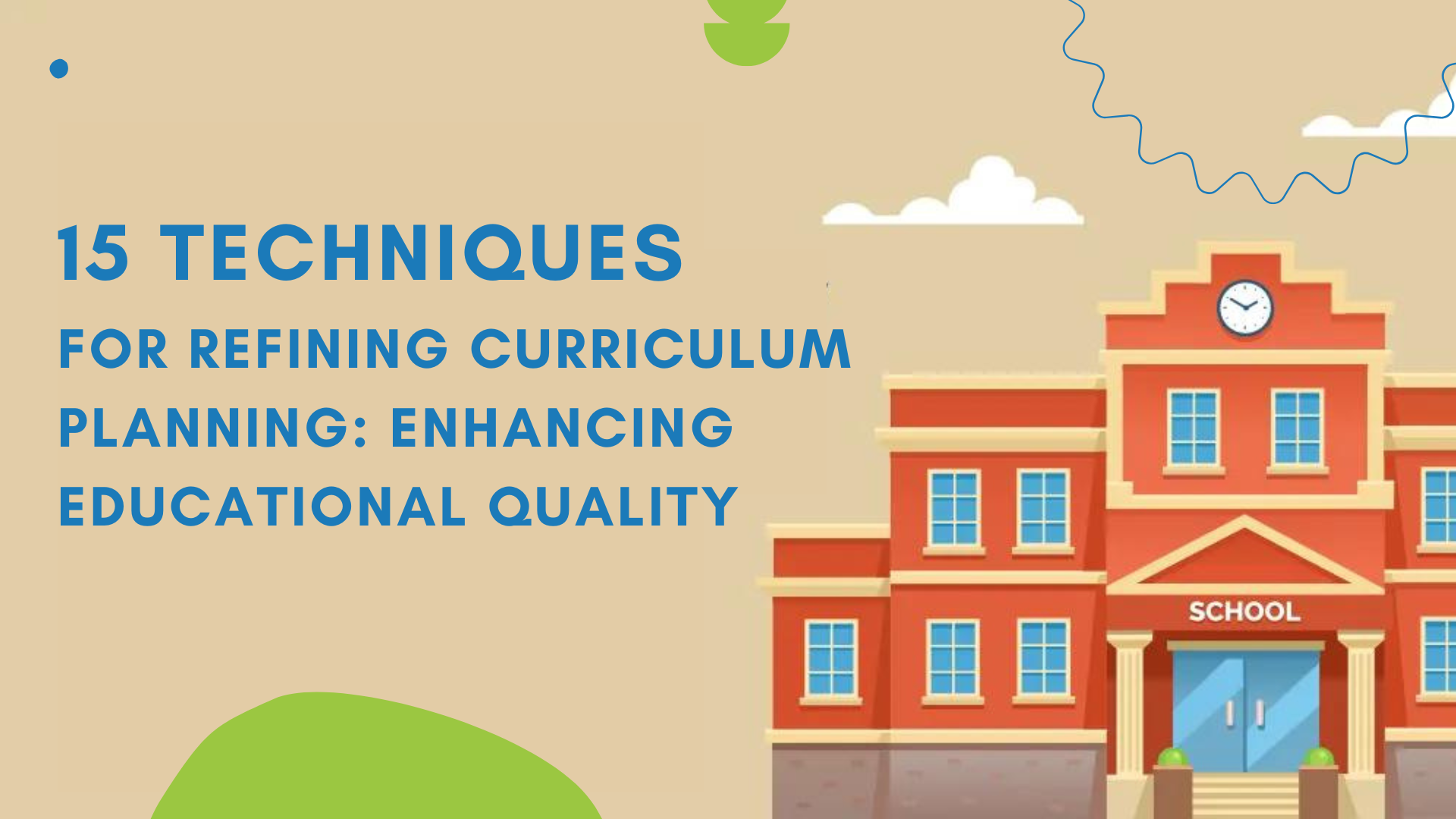
Introduction
Curriculum planning is a critical process that requires continuous refinement to provide high-quality education. Educators play a key role in enhancing educational quality by employing effective techniques in their curriculum planning. In this blog post, we will explore fifteen techniques that educators can utilize to refine their curriculum planning process and create engaging and effective learning experiences for their students.
1. Conducting a Comprehensive Needs Assessment
Begin by conducting a thorough needs assessment to identify the specific learning needs, interests, and abilities of your students. This assessment should consider their prior knowledge, cultural backgrounds, and individual differences. Gathering this information will help you tailor the curriculum to meet the unique needs of your students.
2. Setting Clear Learning Objectives
Define clear and measurable learning objectives that specify what students should know, understand, and be able to do. Well-defined objectives serve as a roadmap for curriculum planning and guide the selection of content, instructional strategies, and assessments.
3. Embracing Differentiated Instruction
Differentiated instruction recognizes and addresses the diverse learning needs and preferences of students. By offering a variety of instructional strategies, materials, and assessments, educators can ensure that every student has access to an inclusive and engaging learning experience.
4. Integrating Technology and Digital Tools
Incorporating technology and digital tools into the curriculum can enhance student engagement and provide opportunities for interactive and personalized learning experiences. Educators should explore educational software, online resources, multimedia platforms, and collaborative tools to augment their curriculum planning efforts.
5. Incorporating Real-World Applications
Making connections between classroom learning and real-world applications is essential for fostering relevance and engagement. By integrating real-life examples, case studies, projects, and field experiences, educators can deepen students’ understanding and motivate them to apply their knowledge in practical contexts.
6. Promoting Active Learning Strategies
Active learning strategies encourage students to actively participate in the learning process. Educators can employ techniques such as group discussions, problem-solving activities, simulations, debates, and hands-on experiments to promote critical thinking, collaboration, and retention of knowledge.
7. Cultivating Critical Thinking and Problem-Solving Skills
Critical thinking and problem-solving are essential skills for students to succeed in the modern world. Curriculum planning should incorporate opportunities for students to analyze, evaluate, and solve complex problems, fostering their ability to think critically and make informed decisions.
8. Incorporating Multicultural and Global Perspectives
In an increasingly interconnected world, it is crucial to expose students to diverse cultures, perspectives, and global issues. By integrating multicultural content, international case studies, and cross-cultural communication activities, educators can cultivate global awareness and promote respect for diversity.
9. Fostering Collaboration and Cooperative Learning
Collaborative learning environments facilitate student engagement, active participation, and the development of social skills. Educators can design curriculum activities that encourage group work, peer-to-peer teaching, and cooperative projects, fostering teamwork and effective communication.
10. Employing Authentic Assessments
Formative assessments provide ongoing feedback on student progress and inform instructional decisions. Educators should incorporate a variety of authentic assessments, such as projects, portfolios, presentations, and performance-based tasks, to assess students’ understanding and skills.
11. Reflecting on Teaching Practices
Engage in regular self-reflection on your teaching practices and curriculum design. Reflecting on instructional strategies, assessment methods, and student outcomes allows for continuous improvement and refinement of the curriculum.
12. Collaborating with Peers
Collaborating with fellow educators and participating in professional development opportunities provide valuable insights and support for refining curriculum planning. Engaging in discussions, attending workshops, and staying informed about educational research and trends helps educators stay current and implement best practices.
13. Monitoring and Evaluation
Continuous monitoring and evaluation of the curriculum’s implementation and impact are essential. Educators should collect and analyze data on student performance, feedback, and engagement to identify areas for improvement. This ongoing assessment enables educators to make data-informed decisions to refine and enhance their curriculum.
14. Emphasizing Social and Emotional Learning
Emphasizing Social and Emotional Learning (SEL) is a vital technique for refining curriculum planning and enhancing the quality of education. Social and emotional skills are crucial for students’ overall well-being, academic success, and future success in life. By incorporating SEL into the curriculum, educators can foster a positive and supportive learning environment that nurtures students’ social-emotional development.
15. Staying Current with Educational Research and Trends
Stay updated with current educational research, trends, and best practices. Read professional journals, attend webinars, and participate in continuing education to refine your curriculum planning techniques based on evidence-based strategies.
Conclusion
By employing these fifteen techniques, educators can refine their curriculum planning process and enhance the quality of education provided to students. By considering student needs, setting clear objectives, incorporating technology and real-world applications, promoting active learning and critical thinking, and staying informed about educational research, educators can create a dynamic and effective curriculum that meets the diverse needs of their students and prepares them for future success.